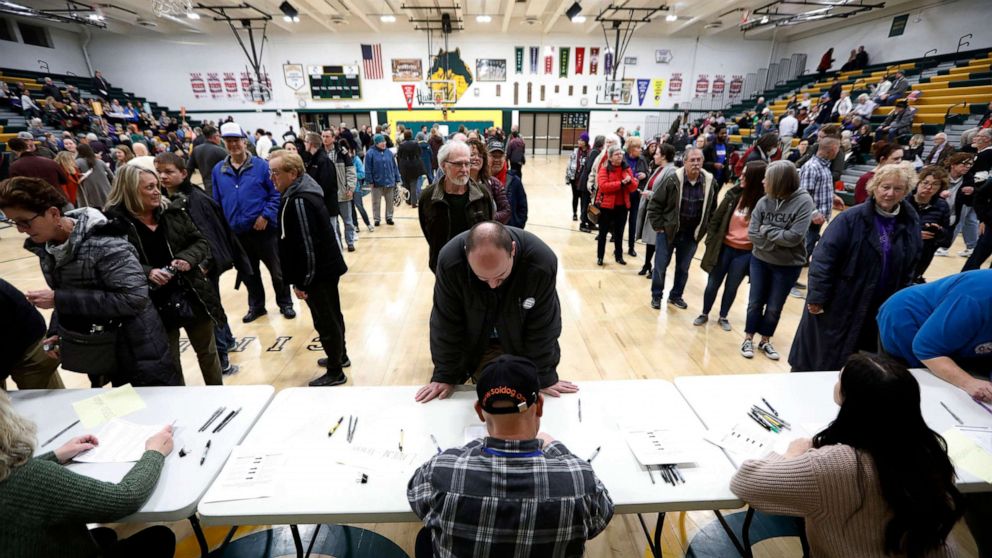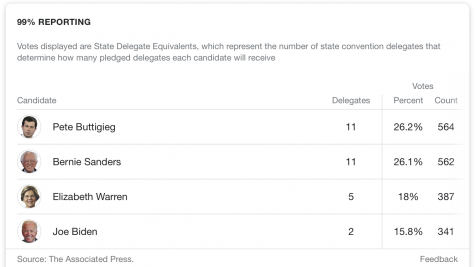
By: Abigail Calandra | Head Editor
February 7, 2020
February 3rd marked the beginning of the nominating contest of the 2020 election cycle: the Iowa Caucuses. This convoluted and chaotic process kicks off the primary election season, with potential Democratic candidates flooding into the state in attempt to prove they’re the most qualified candidate to go head-to-head with Trump in November.
The caucus began at 7 p.m. CT with caucus goers attending one of 1,678 precinct locations (at churches, gyms, or community centers) to pick their preferred candidate. Even Iowans vacationing in Florida were caucusing in St. Petersburg, Gulf Breeze, Miramar, and Port Charlotte. The attendees of the caucus gather in groups and are counted based on their preferred candidate, and then it is determined whether a candidate group is viable or not viable. If a candidate group is not viable, caucus goers must choose another group, convince other people to join their group, or caucus in the uncommitted group. Once the final tally is counted, delegates are awarded to candidates proportional to the amount of supporters the group had.
In order to be viable, the group supporting the candidate must have at least 15% of the total amount of supporters at that specific caucus. Caucus goers that are part of a viable candidate group cannot move, and once supporters of nonviable candidates are realigned, delegates are assigned.
All 50 states have some sort of caucus or primary election, and the Iowa Caucus is just the first. This event often serves as a way to foreshadow how a candidate will perform moving forward. Campaigns often look at this caucus to see who has a chance of continuing to the New Hampshire Primary and who should throw in the towel.
The caucus, an already confusing process, was a colossal disaster. According to the Iowa Democratic Party (IDP), the root of the chaotic caucus was a faulty smartphone app that they thought would streamline the results of the caucus. The addition of the app, while a good idea in theory, had some shortcomings: the app was new and untested, volunteers were unfamiliar with the new system– additionally, although training was offered, the app didn’t work for everyone, and submitting results was more complicated than before.
On Monday night, following the caucus, Democrats took the stage at their watch parties awaiting the results of the party; however, it was announced that results would be delayed due to “quality control checks.” Candidates even released their own internal assessments, with Pete Buttigieg and Bernie Sanders both announcing their victories before the real results.
“The Iowa Caucus has been very interesting to follow with Buttigieg and Sanders having such a close race,” San Clemente High School senior Lexi Polk said. “It will be interesting to see who the Democrats rally behind as the next Democratic nominee for president.”
The results of the caucus were released Wednesday, February 6th by the IDP, but they were riddled with inconsistencies and errors. According to the New York Times, over 100 precincts provided results that were inconsistent, and in some cases the IDP reported results that were different from those of the precincts.
These inconsistencies don’t indicate an effort to rig or compromise the results of the caucus, meaning there’s no apparent bias towards Sanders or Buttigieg. As of Wednesday, with 96 percent of data reported, Sanders is closing the gap with 0.1 percentage points between Buttigieg. These minor errors by the IDP could delay a final projection and raise doubts about a declared winner.

“Buttigieg and Sanders’ near tie in Iowa was an interesting development so close to the primaries, but Biden’s impressively abysmal performance surprised me,” SCHS senior Kate McKernan said. “Democrats may be split between moderation and socialism, but it’s clear that Biden’s brand of genteel, nonpartisan politics has lost much of its appeal.”
As the New Hampshire Primary begins, it’s unclear when the results of the Iowa Caucus will be finalized. This is what we do know: Sanders is going into New Hampshire as front runner, Buttigieg with momentum, Warren in search of a validating win, and Biden in need of a rebound.

Leave a Reply